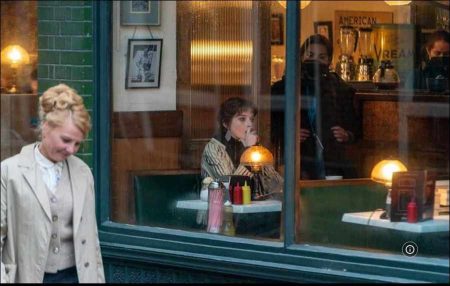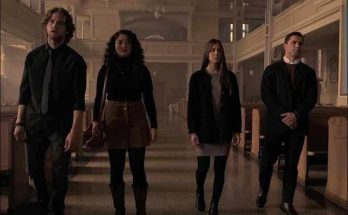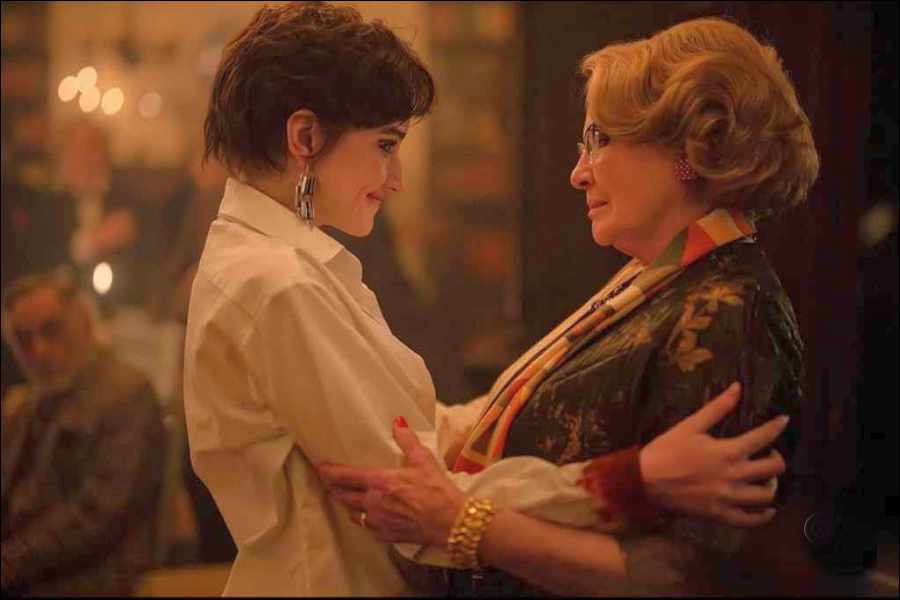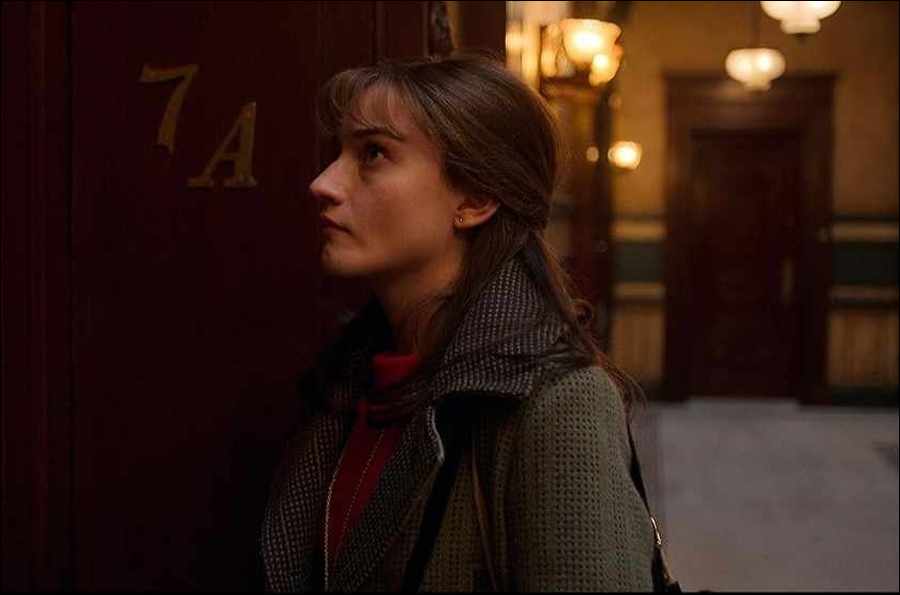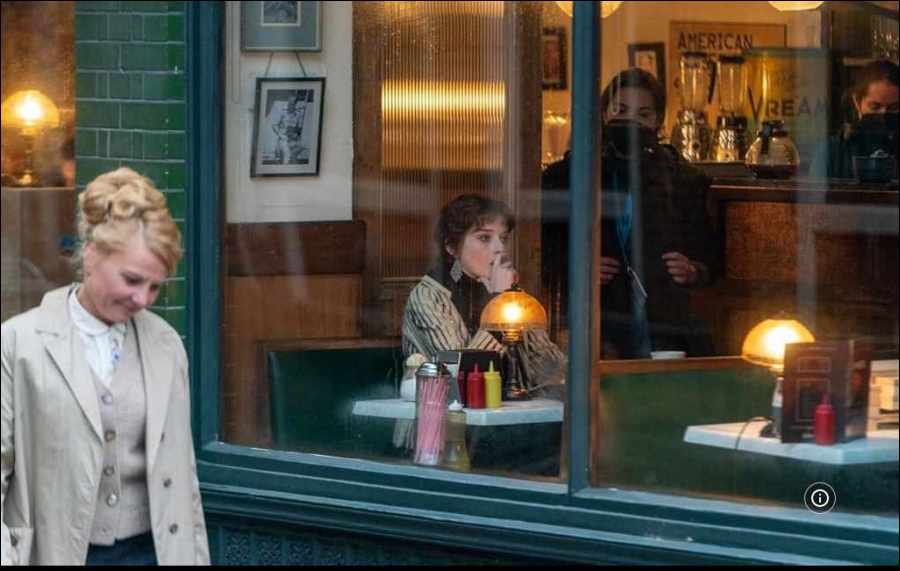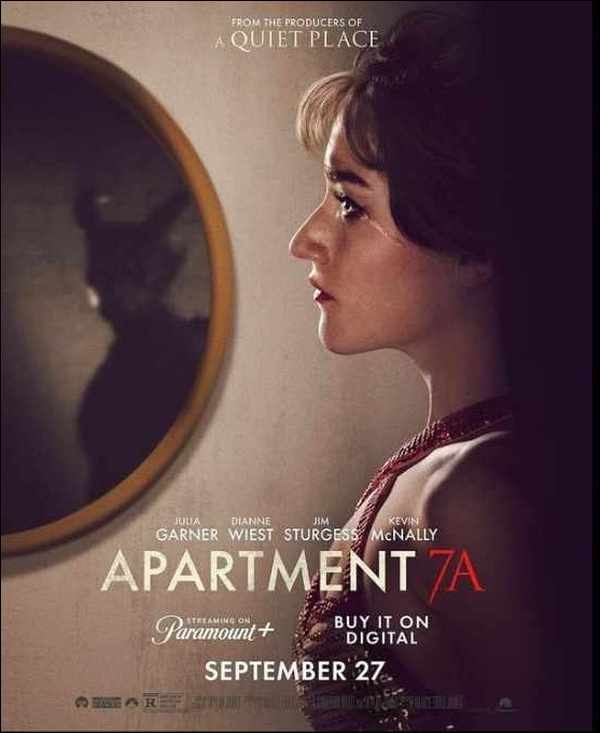Taglines: Rosemary was not the first.
Apartment 7A movie storyline. Terry is a dancer in 1965 who suffers a horrible on-stage accident, leaving her cautious and uncertain about her future. An early scene in which she auditions for a show is one of the film’s best as the play’s director forces her over and over again to repeat the move that injured her, even as it induces more and more obvious pain.
The show’s producer (Jim Sturgess) is intrigued by this fearless young woman, likely because he can quite literally see her tolerance for the physically brutal. She’s really auditioning for a very different job. Because, of course, he’s the mastermind behind the infamous scheme from the Ira Levin book and Polanski film: to impregnate a woman to bring forth the end of the world.
After going to his apartment building, Terry collapses, taken in by the Castevets, played here by Dianne Wiest and Kevin McNally. The latter does a relatively subdued take on Roman, but the Oscar-winning Wiest goes ALL IN on Minnie, clearly attempting something of a Ruth Gordon impression but missing the mark. It makes sense to pay homage to an Oscar-winning performance, but Gordon’s tone felt natural, whereas Wiest comes off like a parody of an exaggerated New Yorker. I was reminded of George Costanza’s mom more than once.
Of course, everyone knows that the kindly Castevets are secretly part of a cult in the Bramford and that poor Terry is their latest target. While “Apartment 7A” plays a bit with the canon of its source, the truth is that we know Terry’s fate, which casts a cloud of doom over the entire proceeding.
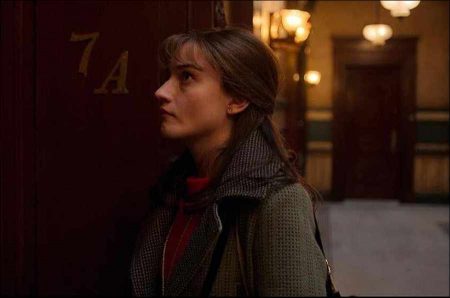
Film Review for The Apartment 7A
Soon after Rosemary (Mia Farrow), the protagonist of 1968’s Rosemary’s Baby, moves into the stately Renaissance revival building known as the Bramford with her husband, she meets Terry Gionoffri. Their encounter is brief but impactful.
Garner does her best to break out of this fog, but she’s not helped by a production that forgets key elements of what worked about the original, including, most of all, setting. Watch just the opening scene of “Rosemary’s Baby” and witness the way Polanski used this well-known space in a manner that was foreboding and familiar at the same time. There’s no personality to the production design here. It’s just a set.
Terry, portrayed with infectious ebullience by Victoria Vetri, eases Rosemary’s nerves about her recent move, reassuring her that the New York apartment’s other occupants are kind. In turn, Rosemary offers Terry a hopeful companionship. The two promise to make their laundry trips together as neither can stand the spooky basement. Before they part ways, Terry tells Rosemary about the Castevets, an older couple who helped her during a rough season. “I’d be dead now if it wasn’t for them,” Terry says, “that’s an absolute fact.”
Paramount+’s Apartment 7A, directed by Natalie Erika James (Relic), uses Terry to introduce a new generation of viewers to that terrifying universe of Satanic cults and maternal purgatory first conjured by author Ira Levin and further popularized by Roman Polanski’s intense cinematic adaptation. James, who co-wrote the screenplay with Christian White and Skylar James, fills out Terry’s biography to explain her tragic fate and strengthen the connection between her and Rosemary. It’s not so much a prequel as it is a parallel story that continues underscoring the limited autonomy of women. Restrictive social mores trap both Rosemary and Terry, albeit in different ways.
Whereas Rosemary is married and toys with the idea of having a child, Terry is a single woman trying to be a Broadway star. Apartment 7A opens with Terry (Julia Garner) preparing for her theater debut in a backstage dressing room. Excitement flashes across her eyes as the ingénue practices vocal warmups and puts finishing touches on her makeup. The glimmer dims when Terry later injures herself on stage. Unable to dance, she self-medicates with pills bought from a local busker and develops an addiction to painkillers. James portrays Terry’s descent into dependency with a laconic efficiency, which initially serves the narrative’s slow-burn pace.
Without a job, Terry relies on her friend Annie (Marli Siu) for support. Another rejection catapults the hurt performer into a deeper depression. Terry becomes so desperate that she follows Alan Marchand (Jim Sturgess), the producer of her most recent audition, to his home at the Bramford, hoping to convince him to give her another chance. But the doorman dismisses Terry at the front desk, and minutes later, she collapses on the sidewalk outside.
The plot picks up when Minnie (an excellent Dianne Wiest) and Roman Castevet (Kevin McNally) rescue Terry. But the tone stays oddly mellow, not quite inspiring the creeping dread of Polanksi’s adaptation, nor the jumpy fright often abused by contemporary horror offerings. Partial blame might lie in the attempts to reconcile Terry’s reality and her star aspirations. James includes a number of musical sequences, usually when Terry is between a waking and sleeping state. But these fever dreams land more as campy interruptions than as surreal and heightened hauntings. They also strip the subtlety out of Apartment 7A’s more understated messaging.
The film is desperate for audiences to understand that in accepting the Castevets’ generosity, Terry has assumed the role of a lifetime. Details of this position become clearer after the dancer moves into the vacant unit next to the older couple. They begin to manage Terry’s life so that she eventually lands a role in a big play and worries less about money. But anything “free” has a tradeoff. Morning sickness tips Terry off to her pregnancy and a visit to a health clinic confirms it. Before Rosemary carried the son of the antichrist, Terry did. Apartment 7A doesn’t investigate that fateful encounter between the two women in Rosemary’s Baby, but their interaction lives in the shadows, serving as a reminder of the Bramford residents’ depravity.
Inheriting the role from Vetri, Ozark star Garner imbues the bubbly Terry with darker undertones. She finds some complexity in her ambition, which drives the character farther into the arms of the Castevets. There’s an assured effort on Garner’s part to do more with the part, but a distance remains between the audience and Terry.
Wiest gets closer to narrowing that gap with her character. She modulates her performance so that Minnie’s personality shifts slowly from an overbearing warmth to an abrasive insistence. One of the strongest scenes sees Minnie, while giving Terry a haircut, communicate that the dancer will never be cleverer than she is. Aside from the final scene, Garner and Wiest are at their best in this nail-bitingly intense moment. As Minnie’s grip tightens on Terry’s hair, the terms of their agreement become devastatingly clear: a baby in exchange for fame.
Through Terry’s pregnancy, the movie, similar to Rosemary’s Baby, underscores the themes of bodily autonomy. James’ film is particularly compelling in post-Roe America, when recent headlines about punitive laws barring abortion access have lent it an urgent political valence, so it’s a shame that its energy doesn’t always match its relevance. Conversations between Annie and Terry heighten the stakes, as does the increasingly hostile relationship between Terry and Minnie, but most of Apartment 7A feels too mellow for its messages.
Apartment 7A (2024)
Directed by: Natalie Erika James
Starring: Julia Garner, Dianne Wiest, Jim Sturgess, Andrew Buchan, Kevin McNally, Rosy McEwen, Kobna Holdbrook-Smith, Marli Siu, Julia Westcott-Hutton, Nikkita Chadha, Anton Blake Horowitz
Screenplay by: Natalie Erika James, Christian White, Skylar James
Production Design by: Simon Bowles
Cinematography by: Arnau Valls Colomer
Film Editing by: Andy Canny
Costume Design by: Michele Clapton
Set Decoration by: Gordon Grant, Tina Jones
Art Direction by: Nick Dent, Adam Faux, Albert McCausland
Music by: Adam Price
MPAA Rating: R for some violent content and drug use.
Distributed by: Paramount Pictures
Release Date: September 27, 2024
Views: 32

